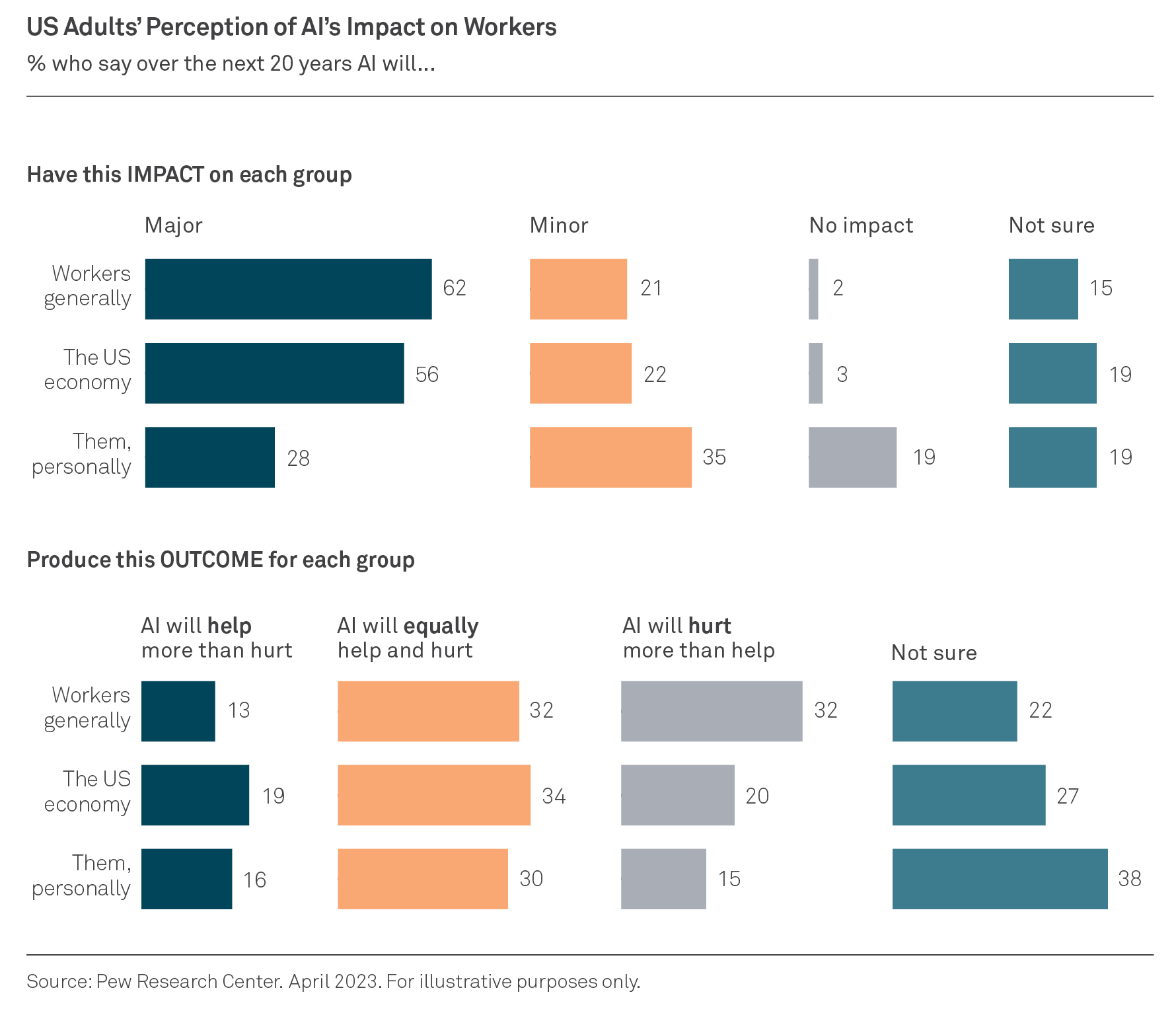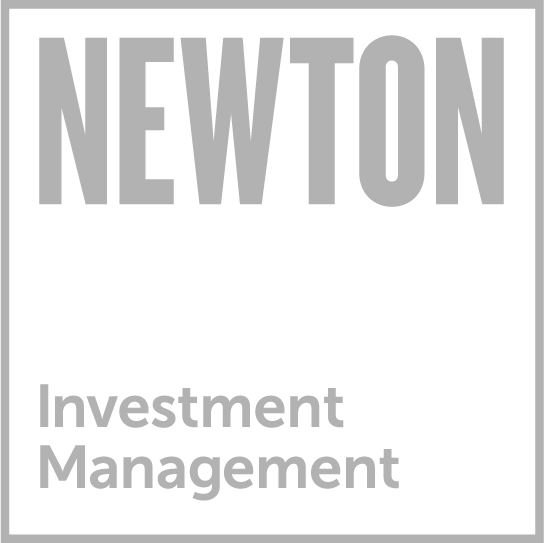August 2023
Artificial intelligence (AI) is sparking excitement - and concern - for businesses and employees alike as the technology is becoming increasingly smart and accessible. Newton Investment Management equity research analyst Brian Byrnes discusses areas where AI is already becoming a star employee.
Highlights
- An estimated 4,000 US workers were automated out of their jobs by AI in May 20231
- AI isn’t likely to eliminate jobs without creating new ones
Welcome new hires Artificial Intelligence (AI), Generative AI and Large Language Models (LLM)! They are smart and quick, but also inexperienced. These new colleagues could help elevate a career - or take it away.
Often with a new advancement, change is typically met with both supporters and sceptics and so far, things don’t seem to be any different with AI. For the sceptics, concerns are heightened when it comes to peoples’ livelihoods. Nearly 4,000 US workers were estimated to be automated out of their jobs by AI in May 2023. Fears appear rife that this is only the beginning. After all, chatbot ChatGPT has achieved exceptionally rapid adoption.

However, Newton Investment Management equity analyst Brian Byrnes notes technology has always shaken things up, so to speak, and this is simply another example of such.
“I think you can look back at any technological disruption, it changes jobs. I don’t think AI will become a broad-based technology that doesn’t create new jobs along the way,” says Byrnes. “You can look at the industrial revolution, for example. During that time a lot of jobs were displaced, but a lot of jobs were created in the meantime.”
As recently as a decade ago hearing the job title “cloud solutions architect” may have conjured images of an environmental scientist perhaps, whereas today people know to associate it with technology. App developer, digital analytics manager and the prestigious social media influencer are a handful of careers that weren’t around just a few years ago.
AI could be the next type of technology to usher in new opportunities. Generative AI is already credited with creating jobs. If this technology takes off, there could be a demand for AI trainers, AI auditors and AI ethicists.2 Perhaps there could even be a head of AI.
Benefits of working with AI
AI has the potential to impact a swath of careers, even those technical in nature. “We’re seeing AI used to write code,” says Byrnes. “We’re seeing developers become 55% more productive in some cases3, which means they can focus their time on added value work.”
Like older generations learning the quirks of collaborating with younger generations (and vice versa), AI is a tool workers may need to get accustomed to. The new AI colleagues can potentially be a real help to workers, taking on the mundane tasks most don’t want to do. Already some big tech giants have launched AI assistance tools for its existing programs.
“I think that people see where AI may help is with simple administrative tasks, like writing the first draft of an email,” says Byrnes. “A lot of people struggle to write the first draft and maybe AI can do that for you. Then you can just critique it. I think a lot efficiencies may be gained.”

More than intelligence
AI isn’t just for office workers – the technology is also making waves in the service industry. Some fast-food restaurants are ready to serve up AI, or at least offer it as a side. AI chatbots are poised to make menial tasks once used to teach teenagers the value of hard work, obsolete.
AI automation in the fast-food industry could potentially be a huge win for businesses and customers alike. In June 2023, one US fast food giant began piloting AI chatbot to reduce miscommunication – for instance answering questions and taking food orders, even if items are not phrased exactly as they appear on the menu. Historically, optimizing AI automation for restaurants proved challenging due to numerous menu options, special requests and background noise.
AI in the workplace could be quite palatable in certain scenarios. Some research estimates half of current work tasks could be automated between 2030 and 2060.4 However, historically tasks have only been partially automated, meaning humans aren’t cut totally out of the equation. Between the 1950s and 2010s, only one of the 270 occupations (elevator operators) listed in the 1950 Census was eliminated due automation.5
While most positions aren’t likely to have the same fate as the dodo, inevitable change is on the horizon.
Note: ChatGPT, nor any of its friends, were used in the creation of this article.
Definitions:
Artificial intelligence (AI): Simulation of human intelligence produced by machines or software
Generative AI: Creates content like text, images and code in response prompts
Large language model (LLM): An algorithm that uses massive amounts of data to recognize, summarize and predict new content
1 Challenger, Gray & Christmas, Inc. Challenger Report. May 2023.
2 PC Magazine. You’re hired: 5 new jobs created by AI. April 2023.
3 GitHub. How generative AI is changing the way developers work. April 2023.
4 McKinsey & Company. The economic potential of generative AI. June 2023.
5 CEPR. How computer automation affects occupations: Technology, jobs and skills. September 2016.
All investments involve risk, including the possible loss of principal. Certain investments involve greater or unique risks that should be considered along with the objectives, fees, and expenses before investing.
Newton Investment Management Limited (“NIM” or the “Firm”) is a registered investment adviser with the U.S. Securities and Exchange Commission (“SEC”) and is incorporated in the United Kingdom (Registered in England no. 1371973) and is authorized and regulated by the Financial Conduct Authority in the conduct of investment business, and subsidiary of The Bank of New York Mellon Corporation (“BNY Mellon”). The Firm is part of the group of affiliated companies that individually or collectively provide investment advisory services under the brand “Newton” or “Newton Investment Management” (“Newton”). Newton currently includes NIM, Newton Investment Management North America, LLC (“NIMNA”) and Newton Investment Management Japan (“NIMJ”).
BNY Mellon Investment Management is one of the world’s leading investment management organizations, encompassing BNY Mellon’s affiliated investment management firms and global distribution companies. BNY Mellon is the corporate brand of The Bank of New York Mellon Corporation and may also be used as a generic term to reference the corporation as a whole or its various subsidiaries generally.
This material has been provided for informational purposes only and should not be construed as investment advice or a recommendation of any particular investment product, strategy, investment manager or account arrangement, and should not serve as a primary basis for investment decisions.
Prospective investors should consult a legal, tax or financial professional in order to determine whether any investment product, strategy or service is appropriate for their particular circumstances. Views expressed are those of the author stated and do not reflect views of other managers or the firm overall. Views are current as of the date of this publication and subject to change.
The information is based on current market conditions, which will fluctuate and may be superseded by subsequent market events or for other reasons. References to specific securities, asset classes and financial markets are for illustrative purposes only and are not intended to be and should not be interpreted as recommendations. Information contained herein has been obtained from sources believed to be reliable, but not guaranteed. No part of this material may be reproduced in any form, or referred to in any other publication, without express written permission.
Not FDIC-Insured | No Bank Guarantee | May Lose Value
© 2023 BNY Mellon Securities Corporation, distributor, 240 Greenwich Street, 9th Floor, New York, NY 10286
MARK-418471-2023-08-22






